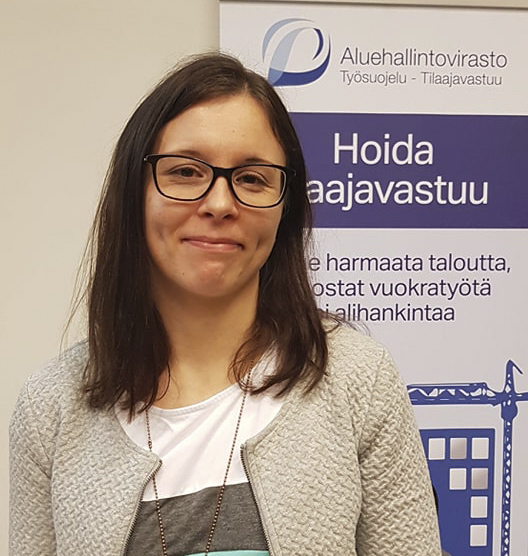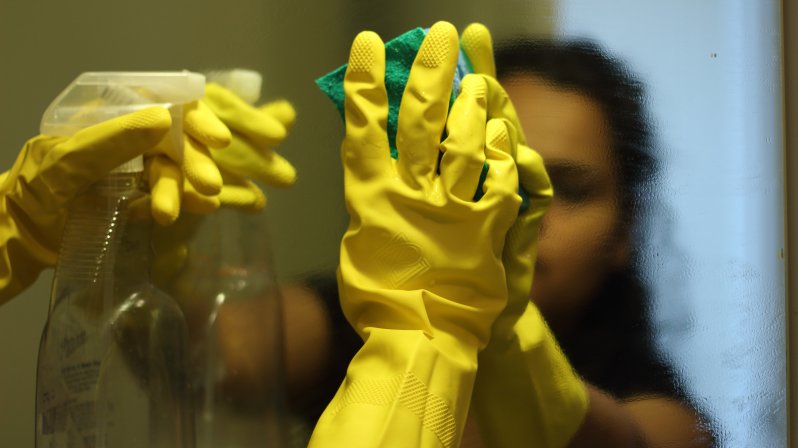Monitoring visits reveal errors in wage payments and time sheets in cleaning firms
The cleaning sector in Finland is seen as a sector that is susceptible to work-related exploitation and human trafficking. In recent years the Regional State Administrative Agency for Southern Finland has targeted its checks especially at small non-organised firms and firms where it has received tip-offs. Errors have been found in employees’ wage payments and time sheets.
”The cleaning sector is only monitored in the Southern Finland region, because the majority of the foreign labour force in cleaning and facility services is concentrated in this region. It is difficult to monitor the cleaning sector because the work is mobile”, says Niina Ahonen, an inspector for the Regional State Administrative Agency for Southern Finland.

Unannounced inspections have been stepped up over the years in the cleaning sector, where they often take place in the evenings and at night. The inspections involve checks on foreign workers’ right to work in the country and they are questioned about their pay and working hours.
”Accident insurance, time sheets, Sunday working, overtime and pay what we usually check. We also check whether workers have been provided with statutory occupational health care”, Ahonen says.
The Regional State Administrative Agency also checks whether the ban on discrimination has been breached, i.e. whether there has been discrimination based on ethnicity, gender or other reasons.
”We haven’t been able to monitor the ban on discrimination in cases where there have been no time sheets at all”, she states.
According to Ahonen the authorities have collaborated productively with the police. A police presence has been reassuring for the agency’s employees and has provided safety when workers are questioned. Word spreads among firms in the sector when inspections are carried out, especially if they are joint operations.
Ahonen says that whilst the situation in the cleaning sector has improved somewhat, the agency’s inspectors still come across underpayment, some of the worst examples being hourly rates of 5 euros or workers not being paid at all.
Monitoring of foreign labour in the cleaning sector in southern Finland
| Total inspections | Unannounced inspections | Jointly with the police | |
| 2016 | 132 | 27 | 14 |
| 2017 | 131 | 60 | 45 |
| 2018 | 122 | 41 | 31 |
Monitoring findings for the cleaning sector in southern Finland
| Work entitlement not in order (all visits) | Errors in pay | Errors in time sheets | |
| 2016 | 25 % | 50 % | 52 % |
| 2017 | 14 % | 43 % | 60 % |
| 2018 | 17 % | 34 % | 51 % |
Source: Regional State Administrative Agency for Southern Finland /Niina Ahonen
Inspection findings for the cleaning sector in southern Finland
Every fourth inspection by the Regional State Administrative Agency for Southern Finland in 2016 found workers who did not have the right to work. This has decreased somewhat, but is still the case in every fifth inspection. Employers have a duty to ensure that foreign employees are entitled to work, meaning they need a residence permit or work entitlement for the EU and EEA area.
Last year’s findings show that errors are still being made in wage payments. One firm in three was not paying wages properly. There has been a noticeable drop, however, and pay has more often been in line with the collective agreement than in previous years. There are still a lot of problems in recording working hours.
Source: Regional State Administrative Agency for Southern Finland /Niina Ahonen
Asylum seekers find employment in the cleaning sector
According to Niina Ahonen, the cleaning sector employs a lot of asylum seekers. This is also borne out by observations made in the agency’s inspections. In the firms where the Regional State Administrative Agency made inspections last year (107 firms), around a tenth of workers were asylum seekers.
In the firms inspected by the Regional State Administrative Agency for Southern Finland in 2018, there were a total of 818 foreign workers, 82 of whom were asylum seekers.
Where inspections were carried out, the majority of those employed without the right to work were asylum seekers working in the cleaning sector.
”Employers don’t necessarily know how to check an employee’s right to work. They need to contact the Finnish Migration Service before employment begins and during employment. Asylum seekers have the same minimum employment conditions as others”, Ahonen stresses.
Asylum seekers can take paid employment three or six months after applying for asylum. The right to work ends when the application has been finally decided. That’s why the Finnish Migration Service recommends that employers check the right to work at 8-week intervals.
The platform economy is a new phenomenon in the cleaning sector
According to Ahonen, light entrepreneurship and various forms of the platform economy are becoming ever more common in the cleaning and facility services sectors. It is problematic that inspections are limited to work done within an employment relationship.
”This phenomenon has been noted. Each inspection assesses separately whether the criteria of an employment relationship are met or not”, Ahonen says.
Subcontractor chains exist in the cleaning sector too. For example, the Regional State Administrative Agency has come across cases where large cleaning firms have organised cleaning work in chains of subcontractors. Monitoring these types of subcontractor chains is challenging.
The inspector says that the new incomes register to be introduced in 2020 will make it easier to access information. It will also be useful when checking domestic cleaning work.
”Using a tax number in the cleaning and other sectors could be one way to keep tabs on these sectors better. Large cleaning firms already use personal identifiers”, Ahonen says.



